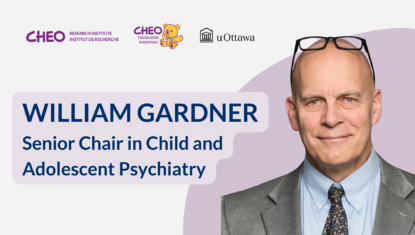William Gardner is a child psychologist, statistician, and mental health services researcher. He studies children’s mental health interventions, statistical methods, psychiatric measurement, and health system change. He is a professor of epidemiology and psychiatry at the University of Ottawa. He is also the CHEO RI and University of Ottawa Senior Research Chair in Child and Adolescent Psychiatry. His current research is funded by the Canadian Institutes for Health Research, the US Centers for Disease Control, the Robert Wood Johnson Foundation, and the Scotiabank Foundation, past funding includes the US National Institute for Mental Health and the US Agency for Health Research and Quality. He has published in Science, the New England Journal of Medicine, JAMA, JAMA Pediatrics, JAMA Psychiatry, Pediatrics, Health Services Research, the American Psychologist, the Psychological Bulletin, Developmental Psychology, and Psychometrika, among other journals. Although he is not an economist, he blogs at The Incidental Economist (https://theincidentaleconomist.com) and can be followed on Twitter as @Bill_Gardner.
Related News
-

26/02/2024
William Gardner Senior Chair in Child and Adolescent Psychiatry
-

08/02/2022
Cannabis-related emergency department visits by youth increased five-fold in Ontario between 2003 and 2017
-

11/06/2019
New research shows dramatic increase in Ontario teens visiting an Emergency Department for self-harm since 2009
Research Projects
-
Physician Follow-Up of Pediatric and Young Adult Emergency Department Visits for Substance Use in Ontario, Canada
01/11/2024
-
Impact of a publicly-funded pharmacare program on prescription stimulant use among children and youth: A population-based observational natural experiment.
27/10/2023
Prescription drug coverage is a less well-studied determinant of medication access among individuals with ADHD. In one US study, children without insurance were less likely to be prescribed stimulants than those with private or public insurance. Similarly, a separate US study found that most stimulant prescriptions were paid through commercial insurance, with copayments required for nearly two-thirds of prescriptions dispensed. Therefore, disparities in insurance status may be an important source of inequity in treatment for children and youth with ADHD, favouring individuals with private insurance and the financial resources to cover out-of-pocket costs. This assertion is supported by findings from research associating higher income with a greater likelihood of stimulant treatment and lower treatment rates in children with ADHD from low-income families despite being at least as likely to meet the diagnostic criteria for this condition as high-income children.
-
Circadian cortisol secretion in adolescent girls with conduct disorder
07/11/2022
This study advanced our knowledge about girls with severe antisocial behavior, discovering that lower circadian cortisol secretion is present in girls with CD, but largely due to decreased volume of cortisol secretion between awakening and 30-minutes post-awakening time. Comorbid internalizing disorders were not associated with differences in circadian secretion of cortisol, compared to girls with only CD.
-
A stochastic optimization approach for staff scheduling decisions at inpatient units
26/10/2022
In this paper, we propose an optimization scheme in order to schedule the operations of the orthopedic surgery division at Habib Bourguiba University Hospital. This type of planning could be performed for a general problem of scheduling “n” operations in “m” operating rooms and “b” recovery beds with the conditions that: m ⩽ b, longer operation takes longer recovery time and no wait as much as possible between the operating room and the recovery room.
-
Peripheral and neural correlates of self-harm in children and adolescents: a scoping review
04/05/2022
Our scoping review demonstrates that this corpus of research is not sufficiently mature for a meta-analysis to identify potential biomarkers. Many conflicting results are reported for the 28 specific correlates. Interpretation of the divergent results is hampered by methods that may have produced biased findings and samples mainly generalizable to clinical populations and girls. Most of the work was done in adolescents, not children younger than 11 years.

